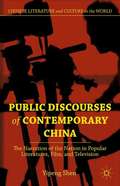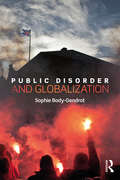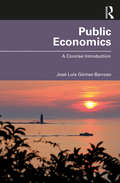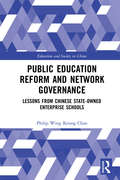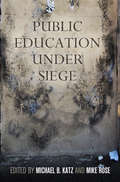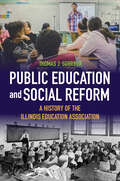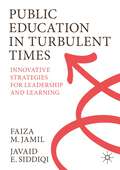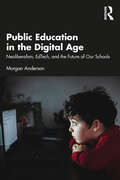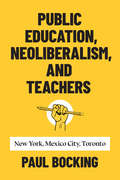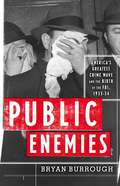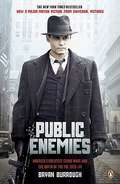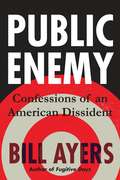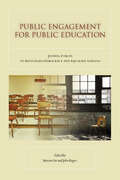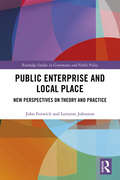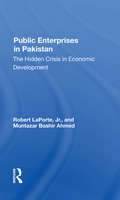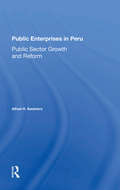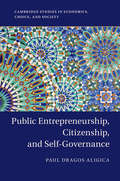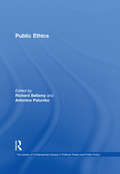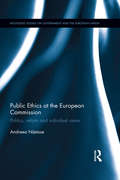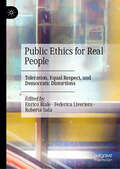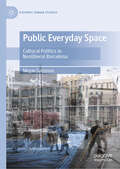- Table View
- List View
Public Discourses of Contemporary China
by Yipeng ShenExploring contemporary Chinese literature, film, and television, Yipeng Shen sheds light on the historical significance of nationalism for mass imagination and identification in the less-than-democratic system of China for the past three decades. Analyzing cultural products from a wide range of media, chapters move from the intellectual idealism of the 1980s, through the post-Tiananmen transition, to the national cinema of the 1990s, and finally to the Internet literature of today. Public Discourses of Contemporary China argues that Chinese subjects have, to varying degrees, transformed the state project of modernization into their own through mass aestheticization of the nation.
Public Disorder and Globalization
by Sophie Body-GendrotThe current growth of incidents of public disorder around the world can be seen as symptomatic of major transformations in globalized society, government, and technology. But while disorder is routinely perceived as a disturbing phenomenon, it can also be a catalyst for positive transformation and regeneration. As social media is increasingly used as a platform for mobilization and organization, local disorder may spread outward through national borders, receiving international coverage and visibility as well as triggering a domino effect of global unrest. Combining qualitative and quantitative research, this ground-breaking text analyzes oppositional notions of order and disorder in global, national, and local contexts and considers the role of the police, the justice system, and other authorities in developing a range of responsive strategies. The author develops a new comprehensive framework for engaging in comparative and historical analysis of public disorder by drawing upon international case studies of public unrest such as 2005 in Paris and 2011 in London; the events in Ferguson and Baltimore that seeded Black Lives Matter; the Occupy movements in Zuccotti Park, Gezi Park, and Hong Kong; and the terror attacks in Paris and Brussels. This dynamic comparative study is informed by extensive international interviews and will be a required reading for students and scholars of criminology, sociology, political science, and urban studies.
Public Economics
by Gareth D. MylesThis textbook provides a thorough treatment of all the central topics in public economics. Aimed at senior undergraduate and graduate students, it will also be invaluable to professional economists and to those teaching in the field. The book is entirely self-contained, giving all the equilibrium theory and welfare economics needed to understand the analyses. The author covers the Arrow-Debreu economy, welfare economics and the measurement of inequality and poverty which lay the foundations and emphasise the important role played by information. Within the competitive economy, he examines commodity taxation, income taxation and tax reform in a certain environment. He goes on to study the public economics of uncertainty, and then treats public goods, externalities, imperfect competition and tax evasion as departures from the standard competitive assumptions and looks at their implication for public economics derived.
Public Economics and the Quality of Life (RFF Urban and Regional Economics Set)
by Alan Evans Lowdon Wingo Jr.This book argues that, if redistribution was the dominant political theme of the 1960s, that of the 1970s would have been most assuredly quality. Furthermore, this seeks to poorly articulated normative concerns of physical and environmental planners to the intellectual tools, old and new, with which economists were addressing policy issues. This will be of particular interest among practitioners and theoreticians identified with the policy sciences.
Public Economics: A Concise Introduction
by José Luis Gómez-BarrosoPublic Economics: A Concise Introduction provides a concise and non-technical overview of the role of government in the economy. Using the questions ‘why?’, ‘what for?’ and ‘how?’, the text initially surveys the place of the public sector in a market economy. It then considers the possible reasons which could justify government involvement. Next, the book examines the aims of state economic activity, and the instruments which a government has at its disposal. Lastly, the final chapter provides an illuminating tour of economic history and history of economic thought in relation to government economic activity. The book offers an international focus throughout, with examples taken from all over the globe. Readers are supported with a range of pedagogical features, including example boxes, chapter objectives and summaries, and end-of-chapter multiple choice and reflection questions. Public Economics: A Concise Introduction will be a valuable text for students on courses in public economics, welfare economics, public finance, public policy and related areas.
Public Education Reform and Network Governance: Lessons From Chinese State-Owned Enterprise Schools (Education and Society in China)
by Philip Wing ChanThis book is located in the field of education governance and sits amidst debates on public school reform in China. It examines how a top-down policy approach has been implemented from central government right down to the district level within the public education system in China. It shows the way networks support negotiation and bargaining at the district level which, in turn, influences the broader education policy of the central government. Using statistical data from education yearbooks, government documents analysis and interviews with main stakeholders in this policy arena, the book incorporates case studies from railway State-Owned Enterprise schools. Analysis of these indicates that the processes of formulating and implementing Chinese education policy can be characterised as a form of network governance, which coordinates actors, decision-making processes and stakeholders’ motivation to comply with collective decisions in Chinese education. Network governance acts as an effective and legitimate way of problem solving that assists policy implementation and education reform in China. By comparing two traditional modes of governance (governance through bureaucracy and the governance through markets), this book shows the network mode of governance in Chinese education is more powerful and significant, especially since the negotiated results among actors in the policy community are favourable.
Public Education Under Siege
by Mike Rose Michael B. KatzProponents of education reform are committed to the idea that all children should receive a quality education, and that all of them have a capacity to learn and grow, whatever their ethnicity or economic circumstances. But though recent years have seen numerous reform efforts, the resources available to children in different municipalities still vary enormously, and despite landmark cases of the civil rights movement and ongoing pushes to enact diverse and inclusive curricula, racial and ethnic segregation remain commonplace. Public Education Under Siege examines why public schools are in such difficult straits, why the reigning ideology of school reform is ineffective, and what can be done about it.Public Education Under Siege argues for an alternative to the test-driven, market-oriented core of the current reform agenda. Chapters from education policy experts and practitioners critically examine the overreliance on high-stakes testing, which narrows the content of education and frustrates creative teachers, and consider how to restore a more civic-centered vision of education in place of present dependence on questionable economistic models. These short, jargon-free essays cover public policy, teacher unions, economic inequality, race, language diversity, parent involvement, and leadership, collectively providing an overview of the present system and its limitations as well as a vision for the fulfillment of a democratic, egalitarian system of public education.Contributors: Joanne Barkan, Maia Cucchiara, Ansley T. Erickson, Eugene E. Garcia, Eva Gold, Jeffrey R. Henig, Tyrone C. Howard, Richard D. Kahlenberg, Harvey Kantor, Michael B. Katz, David F. Labaree, Julia C. Lamber, Robert Lowe, Deborah Meier, Pedro Noguera, Rema Reynolds, Claire Robertson-Kraft, Jean C. Robinson, Mike Rose, Janelle Scott, Elaine Simon, Paul Skilton-Sylvester, Joi A. Spencer, Heather Ann Thompson, Tina Trujillo, Pamela Barnhouse Walters, Kevin G. Welner, Sarah Woulfin.
Public Education and Social Reform: A History of the Illinois Education Association
by Thomas J. SuhrburFounded in 1853, the Illinois Education Association (IEA) and its predecessors have played a vital role in shaping the Illinois public school system. Thomas J. Suhrbur’s history covers the lifespan of the IEA within the larger story of state public education as a battleground for contentious social and economic issues. Suhrbur pays particular attention to the impact of race, gender, religion, and tax policy on the IEA and public schools. He also examines the IEA’s evolution from a professional organization controlled by administrations and officials through its radical transformation into a teacher-led independent labor union. As a workers’ organization, the IEA successfully fought for collective bargaining and organized K–12 and higher education while continually standing against right-wing efforts to privatize education and undermine public schools with vouchers, for-profit institutions, and tax credits. Multifaceted and up to date, Public Education and Social Reform tells the story of the organization and figures dedicated to sustaining and advancing Illinois public education.
Public Education in Turbulent Times: Innovative Strategies for Leadership and Learning
by Faiza M. Jamil Javaid E. SiddiqiPublic Education in Turbulent Times communicates a bold vision for the future of education, addressing the evolving purpose of American public education and the structural innovations schools are using to meet the needs of a rapidly transforming world. Highlighting key challenges that emerged during the immense economic and social disruptions of recent years, the book leverages case studies of four unique school districts where school communities overcame concerns high in the public consciousness – trauma, danger, economic inequality, and racial injustice. These obstacles have hampered efforts to reclaim lost learning opportunities that could define the educational experiences of a generation of students. If educators revert to business as usual, they risk dismissing essential lessons from resilient schools that thrived in the chaos of a global pandemic and its fallout. This book provides rich insights to refocus readers’ attention on achieving a more equitable and safe education system for the future.
Public Education in the Digital Age: Neoliberalism, EdTech, and the Future of Our Schools
by Morgan AndersonEducational technology is now ubiquitous in schooling, both in P-12 and at universities. Despite the imposition of technology in most aspects of teaching and learning, little attention has been given to the implications educational technology has for healthy student development, humane pedagogy, teacher labor, academic freedom, and the aims of social justice. Rather than merely a set of neutral tools, educational technology is bound up with systems of power and privilege that tend to deepen, rather than confront inequality. In calling for a reassessment of the relationship between schools and technology, this book asks readers to think differently about the role technology can serve in socially just schools. An accessible and compelling read, this book will appeal to students and scholars of sociology, social justice, politics, and all those interested in the impact technology is having on the education system in the USA.
Public Education, Neoliberalism, and Teachers: New York, Mexico City, Toronto
by Paul BockingFrom pressure to "teach to the test" and the use of quantitative metrics to define education "quality," to the rise of "school choice" and the shift of principals from colleagues to managers, teachers in New York, Mexico City, and Toronto have experienced strikingly similar challenges to their professional autonomy. By visiting schools and meeting teachers, government officials, and union leaders, Paul Bocking identifies commonalities that are shaping how teachers’ work and public schools function. While arguing that neoliberal education policy is a dominant trend transcending the realities of school districts, states, or national governments, Bocking also demonstrates the importance of local context to explain variations in education governance, especially when understanding the role of resistance led by teachers’ unions.
Public Enemies: America's Greatest Crime Wave and the Birth of the FBI, 1933-34
by Bryan BurroughThe establishment of the FBI as a force against gang crime in the early 1930's.
Public Enemies: America's Greatest Crime Wave and the Birth of the FBI, 1933-34
by Bryan BurroughIn Public Enemies, bestselling author Bryan Burrough strips away the thick layer of myths put out by J. Edgar Hoover’s FBI to tell the full story—for the first time—of the most spectacular crime wave in American history, the two-year battle between the young Hoover and the assortment of criminals who became national icons: John Dillinger, Machine Gun Kelly, Bonnie and Clyde, Baby Face Nelson, Pretty Boy Floyd, and the Barkers. In an epic feat of storytelling and drawing on a remarkable amount of newly available material on all the major figures involved, Burrough reveals a web of interconnections within the vast American underworld and demonstrates how Hoover’s G-men overcame their early fumbles to secure the FBI’s rise to power.
Public Enemy: Confessions of an American Dissident
by Bill AyersIn this sequel to Fugitive Days, Ayers charts his life after the Weather Underground, when he becomes the GOP's flaunted "domestic terrorist," a "public enemy." Labeled a "domestic terrorist" by the McCain campaign in 2008 and used by the radical right in an attempt to castigate Obama for "pallin' around with terrorists," Bill Ayers is in fact a dedicated teacher, father, and social justice advocate with a sharp memory and even sharper wit. Public Enemy tells his story from the moment he and his wife, Bernardine Dohrn, emerged from years on the run and rebuilt their lives as public figures, often celebrated for their community work and much hated by the radical right. In the face of defamation by conservative media, including a multimillion-dollar campaign aimed solely at demonizing Ayers, and in spite of frequent death threats, Bill and Bernardine stay true to their core beliefs in the power of protest, demonstration, and deep commitment. Ayers reveals how he has navigated the challenges and triumphs of this public life with steadfastness and a dash of good humor--from the red carpet at the Oscars, to prison vigils and airports (where he is often detained and where he finally "confesses" that he did write Dreams from My Father), and ultimately on the ground at Grant Park in 2008 and again in 2012.
Public Engagement Made Easy: A Guide for Planners and Policymakers
by Susan CharlandLocal leaders don’t need to become professional facilitators or hire expensive consultants to run a great meeting. Public Engagement Made Easy offers practical and affordable methods that bring ease to one of the most challenging aspects of any local leader’s role: involving the public. The tools and techniques in this book will empower planners, public managers, decision-makers, and other leaders to implement effective public engagement programs that build trust within communities and contribute to successful decisions that stand the test of time.
Public Engagement for Public Education: Joining Forces to Revitalize Democracy and Equalize Schools
by John Rogers Marion OrrCommunity participation plays a large role in the success or failure of our public schools. This book focuses attention on the problem of inequality in public engagement, considering how race, class, ethnicity, language, and immigration status shape opportunities for engagement. Without the active participation of the public, chances for improving school systems are limited. Without equal opportunity for public engagement, those in the lower reaches of stratified society are left largely on the outside looking in-and that all too easily becomes a self-perpetuating cycle. Public Engagement for Public Educationspeaks to the potential for students, parents, community members, and civic leaders to join forces and create more equitable schooling. Such engagement can expand access to quality educational pathways which in turn paves the way to a stronger voice in society and the promise of the American dream. If segments of society are blocked access to those pathways, the book argues, nothing less than the health of American democracy is at stake.
Public Engagement on Genetically Modified Organisms: A Workshop Summary
by Holly RhodesThe National Research Council's Roundtable on Public Interfaces of the Life Sciences held a 2-day workshop on January 15-16, 2015, in Washington, DC to explore the public interfaces between scientists and citizens in the context of genetically engineered (GE) organisms.<P><P> The workshop presentations and discussions dealt with perspectives on scientific engagement in a world where science is interpreted through a variety of lenses, including cultural values and political dispositions, and with strategies based on evidence in social science to improve public conversation about controversial topics in science. The workshop focused on public perceptions and debates about genetically engineered plants and animals, commonly known as genetically modified organisms (GMOs), because the development and application of GMOs are heavily debated among some stakeholders, including scientists. For some applications of GMOs, the societal debate is so contentious that it can be difficult for members of the public, including policy-makers, to make decisions. Thus, although the workshop focused on issues related to public interfaces with the life science that apply to many science policy debates, the discussions are particularly relevant for anyone involved with the GMO debate. "Public Engagement on Genetically Modified Organisms: When Science and Citizens Connect" summarizes the presentations and discussion of the workshop.
Public Enterprise and Local Place: New Perspectives on Theory and Practice (Routledge Studies in Governance and Public Policy)
by John Fenwick Lorraine JohnstonThis book presents the key interactions in local government and public enterprise, drawing together the challenges for local governance in the practice of public entrepreneurship and its response to collaboration, place and place making. Specifically, this book includes the impact of local partnerships and public entrepreneurs in local policy implementation. It is written by established authors bringing together their experience and practice of local partnerships and public entrepreneurship in place-based strategies, and will be of value to local government, new forms of enterprise partnerships, wider agencies and public entrepreneurship scholars as well as policymakers responsible for implementation of place-based regeneration. This text will be of key interest to students, scholars and practitioners in public administration, business administration, local government, entrepreneurship, public sector management and more broadly to those with interests in public policy, business and management, political science, economics, urban studies and geography.
Public Enterprises In Pakistan: The Hidden Crisis In Economic Development
by Robert Laporte Muntazar Bashir AhmedThis book contains a study of the economics and management of public enterprises in Pakistan. It examines their performance, organizational behavior, relationships with other government organizations outside of the sector, and the issues that confront the public enterprise sector and the government.
Public Enterprises In Peru: Public Sector Growth And Reform
by Alfred H SaulniersThis book helps fill the void in teaching materials about the Latin American public sector. It began as two case studies of public enterprises jointly carried out by the Office for Public Sector Studies of the University of Texas at Austin, which the author directed, and the Universidad del Pacifico in Lima. Over the years, the cases expanded into
Public Entrepreneurship, Citizenship, and Self-Governance (Cambridge Studies in Economics, Choice, and Society)
by Paul Dragos AligicaIn this book Paul Dragos Aligica revisits the theory of political self-governance in the context of recent developments in behavioral economics and political philosophy that have challenged the foundations of this theory. Building on the work of the 'Bloomington School' created by Nobel Laureate Elinor Ostrom and Public Choice political economy co-founder Vincent Ostrom, Aligica presents a fresh conceptualization of the key processes at the core of democratic-liberal governance systems involving civic competence and public entrepreneurship. The result is not only a re-assessment and re-articulation of the theories constructed by the Bloomington School of Public Choice, but also a new approach to several cutting-edge discussions relevant to governance studies and applied institutional theory, such as the debates generated by the recent waves of populism, paternalism and authoritarianism.
Public Ethics (The Library of Contemporary Essays in Political Theory and Public Policy)
by Antonino PalumboPolitical realists are accustomed to argue that ethical considerations have no place in public affairs. This is always a debatable view: realism habitually employs a crude utilitarian morality rather than being totally amoral, and ethical considerations have continued to play an ever more prominent role in the thinking and actions of policy makers and politicians. In addition, citizens increasingly expect policies not only to be efficient and effective according to some purely economic or prudential calculation, but also to be equitable and just as well. As a consequence, both the public and private morality of politicians and public officials has come under ever greater scrutiny. The essays collected together in this volume explore the ethical issues raised by the process and substance of policy-making, and discuss whether it is reasonable to expect ethical standards in public affairs.
Public Ethics at the European Commission: Politics, Reform and Individual Views (Routledge Studies on Government and the European Union)
by Andreea NastaseSince the early 2000s, reforms in the area of public ethics have represented a significant part in the European Commission's efforts to improve its internal governance and democratic legitimacy, and address the crisis of public confidence in European integration. This book comprises a study of ethics and public integrity issues in the administrative services of the European Commission. The author traces the reforms implemented in this area since the early 2000s, and asks whether and how they have shaped Commission officials’ thinking about appropriate behaviour in public office. Based on in-depth interviews and the use of vignettes, the book reveals that the influence of ethics regulations is subtle and full of contradictions: while a heightened awareness and discussion of ethical issues exists in the Commission nowadays, the topic is nonetheless often considered as a matter of "common sense". This book breaks new ground as the first analysis of ethics at the level of individual EU officials. It advances a new angle to the study of the Commission as an administrative actor, and sheds light on an important but under-researched component of its efforts to address criticism concerning democratic legitimacy. In the field of administrative ethics, the book tackles research gaps regarding the practice and impact of ethics policies within public organizations. This text will be of key interest to scholars, students and practitioners of EU Studies/Politics, institutional reform, administrative ethics, and more broadly European governance and public policy.
Public Ethics for Real People: Toleration, Equal Respect, and Democratic Distortions
by Federica Liveriero Enrico Biale Roberta SalaThis book develops an innovative paradigm of public ethics that provides a unique insight into three central themes – recognition, social conflicts and democratic distortions – while critically celebrating the work of Anna Elisabetta Galeotti. In honor of her seventieth birthday, this edited collection brings together leading scholars in the field of normative political philosophy to reason upon the main strands of her research. The volume envisages a general paradigm of public ethics to deal with social conflicts that involve structural dynamics and deliberative deficits. While addressing diverse yet interrelated topics, all the contributors demonstrate a commitment to the ideal that, in the construction and reform of social and political institutions, respect for individuals as the makers of their own lives should act as the guiding principle. Against this backdrop, this volume strikes a difficult-to-reach balance between refined theorizing over classical themes of the liberal tradition and the ability to open these classic themes to new strands of research. The collection deals with crucial contemporary challenges to the democratic order, such as democratic backsliding and the breach of social trust, legal and democratic fights over free speech, multicultural clashes in highly diverse societies, and reparation for historical wrongs.
Public Everyday Space: Cultural Politics in Neoliberal Barcelona (Hispanic Urban Studies)
by Megan SaltzmanThis book explores how everyday practices in public space (sitting, playing, walking, etc.) challenge the increase of top-down control in the global city. Public Everyday Space focuses on post-Olympic Barcelona—a time of unprecedented levels of gentrification, branding, mass tourism, and immigration. Drawing from examples observed in public spaces (streets, plazas, sidewalks, and empty lots), as well as in cultural representation (film, photography, literature), this book exposes the quiet agency of those excluded from urban decision-making but who nonetheless find ways to carve out spatial autonomy for themselves. Absent from the map or postcard, the quicksilver spatial phenomena documented in this book can make us rethink our definitions of culture, politics, inclusion, legality, architecture, urban planning, and public space.
